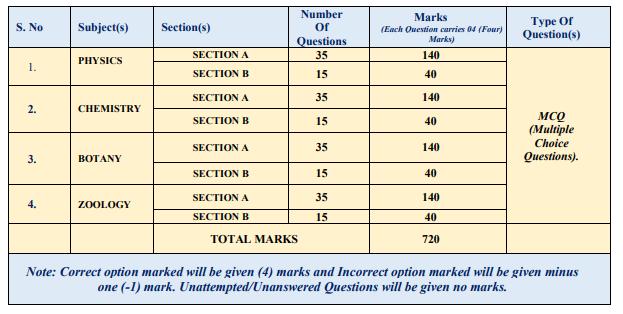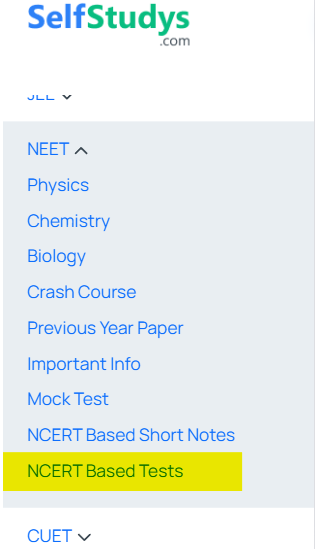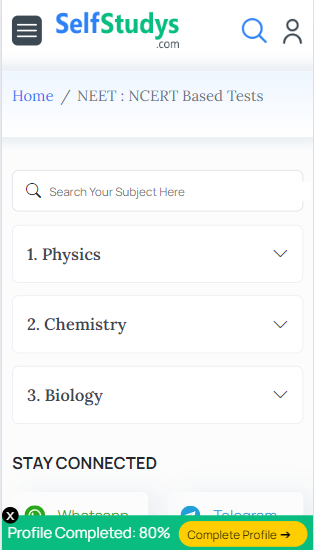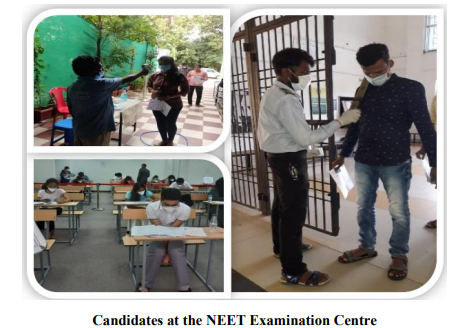-
1. Physics
- 0. Latest Tests
- 1. Physical World
- 2. Units and Measurements
- 3. Motion in a Straight Line
- 4. Motion in a Plane
- 5. Laws of Motion
- 6. Work, Energy and Power
- 7. System of Particles and Rotational Motion
- 8. Gravitation
- 9. Mechanical Properties of Solids
- 10. Mechanical Properties of Fluids
- 11. Thermal Properties of Matter
- 12. Thermodynamics
- 13. Kinetic Theory
- 14. Oscillations
- 15. Electric Charges and Fields
- 16. Electrostatic Potential and Capacitance
- 17. Current Electricity
- 18. Moving Charges and Magnetism
- 19. Magnetism and Matter
- 20. Electromagnetic Induction
- 21. Alternating Current
- 22. Electromagnetic Waves
- 23. Ray Optics and Optical Instruments
- 24. Wave Optics
- 25. Dual Nature of Radiation and Matter
- 26. Atoms
- 27. Nuclei
- 28. Semiconductor Electronics: Materials, Devices & Simple Circuits
- 29. Communication Systems
-
2. Chemistry
- 0. Latest Tests
- 1. Some Basic Concepts Of Chemistry
- 2. Structure of Atom
- 3. Classification of Elements & Periodicity in Properties
- 4. Chemical Bonding and Molecular Structure
- 5. States of Matter : Gases & Liquids
- 6. Thermodynamics
- 7. Equilibrium
- 8. Redox Reactions
- 9. Hydrogen
- 10. s-block elements
- 11. The p-Block Elements
- 12. Some Basic Principles & Techniques
- 13. Hydrocarbons
- 14. Environmental Chemistry
- 15. Chemistry in Everyday Life
- 16. Solid State
- 17. Solutions
- 18. Electrochemistry
- 19. Chemical Kinetics
- 20. Surface Chemistry
- 21. Isolation of Elements
- 22. p-Block Elements
- 23. D and F - Block Elements
- 24. Coordination Compounds
- 25. Haloalkanes and Haloarenes
- 26. Alcohols, Phenols and Ethers
- 27. Aldehydes, Ketones and Carboxylic Acids
- 28. Amines
- 29. Biomolecules
- 30. Polymers
-
3. Biology
- 0. Latest Tests
- 1. Living World
- 2. Biological Classification
- 3. Plant Kingdom
- 4. Animal Kingdom
- 5. Morphology of Flowering Plants
- 6. Anatomy of Flowering Plants
- 7. Structural Organisation in Animals
- 8. Cell - The Unit of Life
- 9. Biomolecules
- 10. Cell Cycle and Cell Division
- 11. Transport in Plants
- 12. Mineral Nutrition
- 13. Photosynthesis in Higher Plants
- 14. Respiration in Plants
- 15. Plant - Growth & Development
- 16. Digestion & Absorption
- 17. Breathing and Exchange of Gases
- 18. Body Fluids and Circulation
- 19. Excretory Products and their Elimination
- 20. Locomotion and Movement
- 21. Neural Control and Coordination
- 22. Chemical Coordination and Integration
- 23. Reproduction in Organisms
- 24. Sexual Reproduction in Flowering Plants
- 25. Human Reproduction
- 26. Reproductive Health
- 27. Principles of Inheritance & Variation
- 28. Molecular Basis of Inheritance
- 29. Evolution
- 30. Human Health & Diseases
- 31. Strategies for Enhancement in Food Production
- 32. Microbes in Human Welfare
- 33. Biotechnology: Principle & Processes
- 34. Biotechnology & its Applications
- 35. Organisms and Population
- 36. Ecosystem
- 37. Biodiversity and its Conservation
- 38. Environmental Issues
NCERT Based Questions For NEET
Go through the NCERT Based Questions for NEET at Selfstudys to have a better chance of qualifying for this examination. To assist you in your preparation and help you perform better, we have come up with a variety of questions for the National Eligibility Entrance Test.
Every year, lakhs of candidates register for NEET to pursue various medical programs. We recommend you solve as many NEET NCERT Questions with solutions as possible before taking up the final examination.
The Summary of the NEET Examination
NEET (National Eligibility Entrance Test) is a highly competitive examination across the country in which practice and preparation are the only keys to mastering it. Here is a summary of the NEET examination that outlines the major themes and proceedings in this examination.
|
Aspects |
Description |
|
Name of the examination |
National Eligibility Entrance Test |
|
Type of Examination |
Entrance exam for undergraduate medical programs in India. |
|
The exam-conducting authorities |
National Test Agency (NTA) |
|
Eligibility Criteria |
An Indian citizen or OCI cardholder passed the 12th standard with Physics, Chemistry, Biology, and English |
|
Exam Pattern |
Multiple Choice Questions (MCQs) |
|
Total Subjects |
|
|
Total Marks |
720 Marks |
|
Duration of exam |
3 hours and 20 minutes |
|
NEET 2026 Exam Date |
First Sunday of May 2026 or May 3, 2026 |
|
NEET 2026 application form release and exam date announcement |
First week of February 2026 |
|
NEET 2026 answer key release |
Second week of June 2026 |
|
NEET 2026 admit card |
First week of May 2026 |
|
NEET 2026 result and final answer key |
Second week of June 2026 |
|
Negative Marking |
For an incorrect answer, 1 mark will be deducted, and no marks are awarded or deducted for unattempted questions |
|
Official Website |
|
|
Our Platform |
Online NCERT Based Questions for NEET in English
Once you have access to online NCERT Based Questions for NEET in the English language, you can easily understand the complex concepts by yourself. For NEET, English helps in understanding the tricky medical terminologies. You ultimately get the required knowledge and diverse learning options in your own chosen language.
Utilize the NCERT Based NEET Questions With Solutions
The optimum utilization of the NCERT Based NEET Questions With Solutions of different chapters and questions is none other than a big treat. Selfstudys offers a comprehensive list of serial-wise chapters that help you to cover each topic one by one. Here you’ll find solutions for each fact/definition, statement, matching, critical-thinking, and assertion-type questions. Moreover, we advise you to go through these NCERT questions once you’re done with the latest NEET syllabus.
Subject-Wise NCERT Based NEET Questions
On the online educational platform of Selfstudys, you’ll find all three subjects Physics, Chemistry, Biology for NEET. You can practice all the NCERT Based NEET Questions as many times as you want.
NCERT Based Physics Questions for NEET
To solve the Physics NCERT based question paper for the NEET Examination, you must have finished the below chapters wisely. Otherwise, you’ll not be able to understand the typology of questions. NEET is an important competitive examination and physics is one of the toughest parts that you can’t avoid even if you want to.
NCERT Based Chemistry Questions for NEET
The below chemistry chapters are purely based on the NCERT syllabus. You can use the mind map technique to revise each chapter carefully. Most of the MCQs are selected from both NCERT Text Book and Exemplars. Chemistry is considered to be the easiest section out of all for the NEET examination. Also, try to utilize detailed solutions for each question.
NCERT Based Biology Questions for NEET
Here is a list of all the biology chapters and concepts that you must have studied in your previous standards. Hence, it becomes less challenging to finish them all. For the NEET examination, You should try to get into depth of the concepts. In addition to this, the NEET biology section is mainly classified into two sections: Zoology and Botany.
Latest Pattern of NEET Examination
Technically, the NEET's latest examination pattern comprises four subjects. Each subject is divided into two sections - A & B respectively. Section A consists of 35 questions and Section B will have 15 questions. Out of these 15 questions, you can choose to attempt any 10 questions. This way, the total number of questions and utilization of time remains the same.

Additionally, the NEET examination is specially designed with machine-gradable OMR sheets using a ball blue pen, which is given at the examination center.
Unveiling the Importance of NCERT Based Questions for NEET
Here is a list of some additional features, you’ll get to know once you include these NCERT questions in your NEET preparation journey.
- Based on NCERT Syllabus: All sets of NCERT based NEET questions are designed from the NCERT syllabus. These questions also ensure that you are well-prepared for the exam. Also, you build a strong foundation in all the important areas.
- Available in Multiple Languages: The NCERT based question paper for NEET is available in multiple languages, including Hindi, English, Tamil, Telugu, and Marathi. This way, questions are accessible to all candidates in India.
- NEET NCERT Based Questions with Solutions: Selfstudy’s NCERT based questions for NEET with solutions offer multiple doors of opportunities for NEET aspirants across the country. It works as the most valuable resource in the final duration of an examination.
- Embedded Timer: In each set of NCERT based question paper for NEET, there’s a feature embedded timer that runs when you start these questions. This way you get a similar example of the actual NEET examination.
Attempt NCERT Based NEET Questions from Selfstudys
If you want to prepare for the NEET Examination seriously, then follow the below steps to access subject-wise NCERT based questions for the NEET exam on our platform.
- Visit the homepage of Selfstudys by searching the main domain in your web browser.

- Tap on the left side of the navigation icon, scroll down a bit, and select for ‘NEET’ section as highlighted through this image.

- A new slide will open within the NEET section and you have to select for last option i.e. ‘NCERT Based Tests’ and move further.

- Lastly, you can take a look at all the NEET subjects and their NCERT Based questions available on our platform. You can pick any set of your choice and begin your preparation without any delay.

How NCERT-Based Questions Shape NEET Success?
The official NEET syllabus (According to the NTA) has most of the chapters from the class 11 and 12th standard NCERT textbooks. Hence, the purpose of offering these questions is absolutely clear. Take a look at some benefits after solving these NCERT questions for NEET.
- Cracking the NEET exam requires a strategic approach and utilizing NCERT-based questions forms a cornerstone of that strategy.
- You will gain confidence in your preparation when you consistently perform well in the NCERT based questions. This confidence is crucial for maintaining calmness and improves your performance in the high-stakes NEET examination.
- Attempting the NCERT-based question helps you to develop effective time management strategies. You learn to prioritize questions, allocate time wisely, and maintain focus under pressure. Regular practice enhances accuracy and you get to maximize your scores within the stipulated time frame.
List of Instructions Regulates in the NEET Examination Hall
Here is a list of some general instructions issued by NTA for all the candidates while they are in the NEET examination hall. You should follow all the instructions carefully, as there are strict rules and regulations in the examination hall. Ethically, you should not use any unfair means of material during the examination.

|
Date of the Examination |
5th May 2024 (Sunday) |
|
Timing and Duration of the Examination |
02.00 pm to 05.20 pm (Indian Standard Time) (3 hours 20 minutes) |
|
Last Entry to the Examination Centre |
01.30 pm |
|
Sitting on the seat in the Examination Hall/Room |
01.15 pm onwards |
|
Announcement of Important Instructions and Checking of Admit Cards by the Invigilator |
01.30 pm to 01.45 pm |
|
Distribution of Test Booklet by the Invigilator |
01.45 pm |
|
Writing of particulars on the Test Booklet by the Candidate |
01.50 pm |
|
Test Commences |
02.00 pm |
|
Test Concludes |
05.20 pm |
Medium of NCERT Based Questions for NEET Examination
The NTA (National Test Agency) has issued these 13 regional languages as the medium of NEET question papers. Moreover, You can opt for NCERT-based questions in any one of the following languages. The option of choosing a language is given to candidates during the filling of the application form. Your chosen option cannot be changed.
|
Medium of NCERT Based Questions for NEET Examination |
English, Hindi, Assamese, Bengali, Gujarati, Malayalam, Kannada, Marathi, Odia, Tamil, Telugu, Urdu, and Punjabi. |
Key to Conquer the NCERT Based Question Paper For NEET Examination
Preparing for the NEET examination is a challenging task. You should always use accurate, reliable, and trustworthy study materials for this competitive examination.
Do’s
- Attempt the NCERT based questions for the NEET examination with consistency. This way, you’ll get habitual of concepts, question format, and limitation of time itself.
- Solve each NCERT based NEET question with focus. We advise you to use these as NEET mock tests, create the real exam conditions, set a timer, and try to avoid disturbance.
- You can discuss challenging NCERT based question papers for NEET questions with classmates or mentors. This way, you gain different perspectives and clarify doubts.
Don’ts
- You should not ignore the difficult questions and try to identify your weaknesses in each concept.
- Don’t ignore your revision schedules because it is the ultimate key. You should Revise regularly to ensure you have understood the concepts.
- Don’t ignore your health and well-being. Get enough sleep, eat healthy, and take breaks to avoid burnout and maintain peak performance.
Why Study NCERT For NEET Preparation?
For the NEET exam preparation, the standard NCERT books are always prioritised by NTA. The official NEET syllabus undoubtedly covers most of the chapters from class 11 and 12 NCERT books.
- There are many NCERT based questions for NEET in terms of format and difficulty level that directly mirror questions found in NCERT textbooks.
- The NCERT’s standard textbooks are renowned for their clear, concise, and well-structured information. These are ideal for grasping basic concepts and building a strong foundation for further learning.
- There are around 80-85% of questions from NCERT sources. It focuses on core principles and basic concepts in NCERT that give you a deeper understanding. It also allows you to apply your knowledge in various scenarios and solve your problems effectively.
- Your consistent practice with NCERT based question papers for NEET clears your understanding and builds confidence. Hence, utilize NCERT textbooks actively. Try to go beyond answers and work on your mistakes.
Best Books for NCERT Based Questions for NEET
Selecting the best book for preparation is your halfway victory toward the NEET examination. Below is a subject-wise list of the best NCERT books highlighted. You can either purchase these books or study from online archives to master the NEET examination.
|
Subjects |
NCERT Books for NEET |
|
Physics |
|
|
Chemistry |
|
|
Biology |
|







 Profile
Profile Signout
Signout










 Quiz
Quiz
 Get latest Exam Updates
Get latest Exam Updates 










